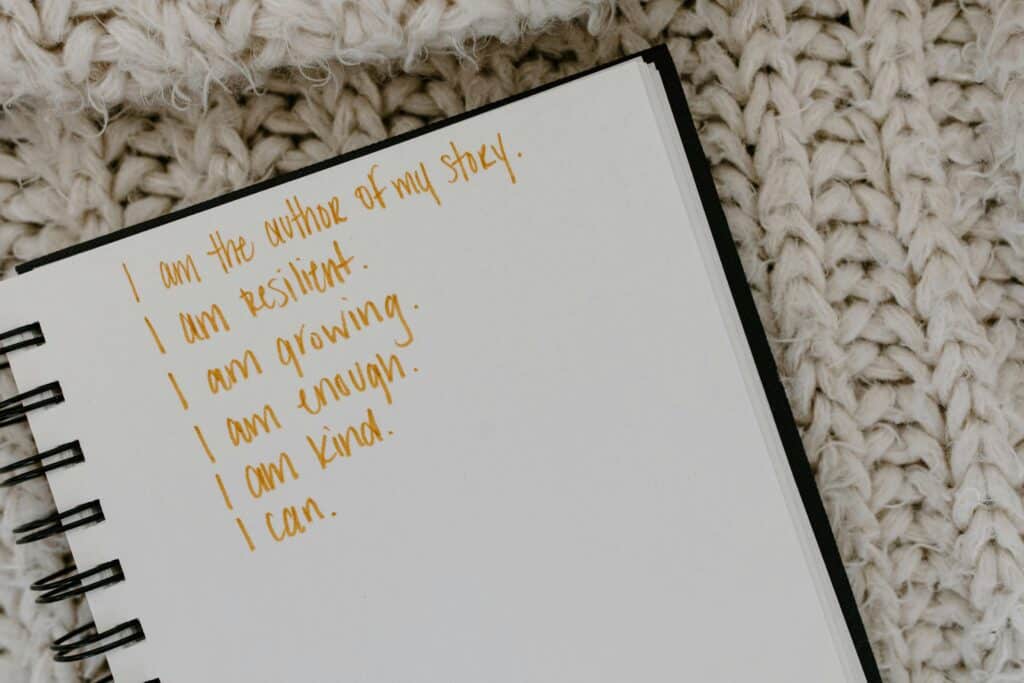
Daily Affirmations: Rewire the Brain for Positivity
Get started with daily affirmations and give yourself a boost in self-esteem, reduce feelings of anxiety, and feel happier, more calm and confident.
Practicing daily affirmations involves repeating specific positive statements about yourself—things that reflect your values, strengths, and intentions.
Read this blog post right to the end and get your own free guide to download. Plus there’s a link to a how-to video on how to start your own daily affirmations practice.
Doing affirmations sounds super simple, but choosing the right phrases and practicing over time can yield awesome results. The use of self-affirmations is grounded in solid psychological theory.
According to self-affirmation theory, when we focus on what truly matters to us, we strengthen our sense of identity and personal integrity. In short, affirmations help us stay grounded in who we are.
What the Brain Tells Us
Interestingly, neuroscience backs this up. Studies using fMRI scans have found that self-affirmation lights up areas of the brain like the ventromedial prefrontal cortex—regions involved in processing information about ourselves and making value-based decisions. This kind of brain activity suggests affirmations do more than just make us feel good in the moment. Instead, they can actually help shape how we handle stress and how we see ourselves.

How Affirmations Ease Stress
Researchers have found that people who spent just 20 seconds a day doing a simple self-compassionate affirmation exercise experienced noticeable drops in stress and increases in emotional well-being. That’s just a few seconds a day making a meaningful difference—pretty powerful, right? Here’s one fo the studies in case you are interested in reading more.
The benefits aren’t just short-term. Longitudinal research shows that regular self-affirmation can lead to lasting boosts in self-esteem. Over time, these small, consistent moments of self-kindness can help us become more resilient, more confident, and more mentally well.

How to Practice Daily Affirmations (and Actually Make Them Work)
Starting a daily practice doesn’t have to be complicated.
Here’s how to build a routine that’s simple, effective, and backed by psychology:
1. Choose Affirmations That Matter to You
Generic phrases like “I am enough” are a good start. However, to get even more benefits use statements that are personal and specific. Think about what you value, what you’re working on, or what challenges you’re facing. Then create statements that reflect those truths.
-
Instead of: “I am confident.”
Try: “I am learning to speak up and trust my voice in meetings.”

2. Keep Affirmations Short & Easily Repeatable
A good affirmation is short enough to say in one breath and clear enough to remember throughout the day. Repeat out loud (or silently if you’re in public) 2–3 times to help reinforce them.
3. Practice Affirmations at the Same Time Each Day
For best results, make affirmations part of your routine by pairing them with something you already do. This is called “habit-stacking” and can help solidify new routines into your life. Perhaps right when you wake up, or when you are making coffee, exercising, brushing your teeth or starting your workday. This “habit stacking” makes it easier to stay consistent.

4. Already True Right Now
Construct your affirmations as if they’re already true. This helps train your brain to see the new belief as part of your identity, not something far off in the future.
-
Say: “I handle challenges with calm and clarity.”
NOT: “I will try to be less anxious tomorrow.”

5. Feel It and See It
Affirmations work best when you don’t just say them—you feel them. Close your eyes and visualize yourself living the affirmation. Feel the confidence, peace, or joy as if it’s already happening.
6. Write Them Down (Bonus Tip!)
Write your affirmations and deepen their impact.
Put them in your journal, on sticky notes, or in your phone’s notes app.
When you see them in writing it reinforces the message.

Sample Daily Affirmations to Get You Started
-
“I am resilient. I’ve overcome hard things before and I can do it again.”
-
“My worth is not defined by my productivity.”
-
“I show up for myself with kindness and curiosity every day.”
-
“It’s safe for me to rest and take up space.”
-
“I am learning and growing, and that’s enough.”
Practicing daily affirmations isn’t about pretending life is perfect—it’s about choosing thoughts that help you show up with more clarity, compassion, and courage.
With just a minute or two each day, this simple practice can become a powerful anchor for your mental and emotional well-being.






